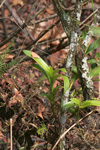Dingy Flowered Star Orchid (Epidendrum amphistomum)
Part of the Florida's Native and Naturalized Orchids Website
Classification:Kingdom: Plantae - Plants
Subkingdom: Tracheobionta - Vascular Plants
Superdivision: Spermatophyta - Seed plants
Division: Magnoliophyta - Flowering plants
Class: Liliopsida - Monocotyledons
Subclass: Liliidae - Lily/related subclass
Order: Orchidales - Orchid order
Family: Orchidaceae - Orchid Family
Subfamily: Epidendroideae - Epidendroids
Tribe: Epidendreae - Cattleya tribe
Subtribe: Laeliinae - Laelias and related.
|
Distribution Map: |
Description: Synonyms: Epidendrum anceps. Summary: Plant an epiphytic orchid bearing numerous canes with wide, almost flat leaves. Flowering stem a compact terminal raceme (almost an umbel). Flowers can range in color from green to purple to bronze to orange-yellow. Lip spoon-shaped with a prominent mid-ridge. Common Name: Dingy Flowered Star Orchid Habitat: Epiphytic on a wide variety of hardwoods in the southern swamps of the Everglades and Big Cypress. Flowering season: January through July |
Images:
 Dingy Flowered Star Orchid (Epidendrum amphistomum) |
 Dingy Flowered Star Orchid (Epidendrum amphistomum) |
 Dingy Flowered Star Orchid (Epidendrum amphistomum) |
Description:
This species is encountered with relative frequency in the southernmost portions of the state of Florida, trailing a bit behind Epidendrum nocturnum and Epidendrum rigidum for the most commonly seen epiphytic orchid.
Plants consist of a cluster of cane-like growths with many clasping leaves. These can be distinguished vegetatively from the somewhat similar Epi. nocturnum by how much wider and thinner the leaves are compared to Epi. nocturnum's narrower, fleshier leaves.
Flowering can occur any time of year, but tends to favor the winter to spring months. The flower stem ascends beyond the tip of a mature growth, sometimes by a fair amount. The flowers at the tip of the stem are clustered closely together, forming an almost hemispherical shape. Flower color can range from green through purple to yellow-orange. The particular plants my colleague and I photographed recently were a lovely creamsicle orange with greenish columns and yellow-cream lips. Hardly a good candidate for the common epithet 'Dingy Flowered Star Orchid'.
Copyright © 2009-2020 Prem Subrahmanyam, All Rights Reserved.
No Text or Images from this web site may be used, in whole or in part, without the express permission of the author.
For further information, see the Terms of Use page.


